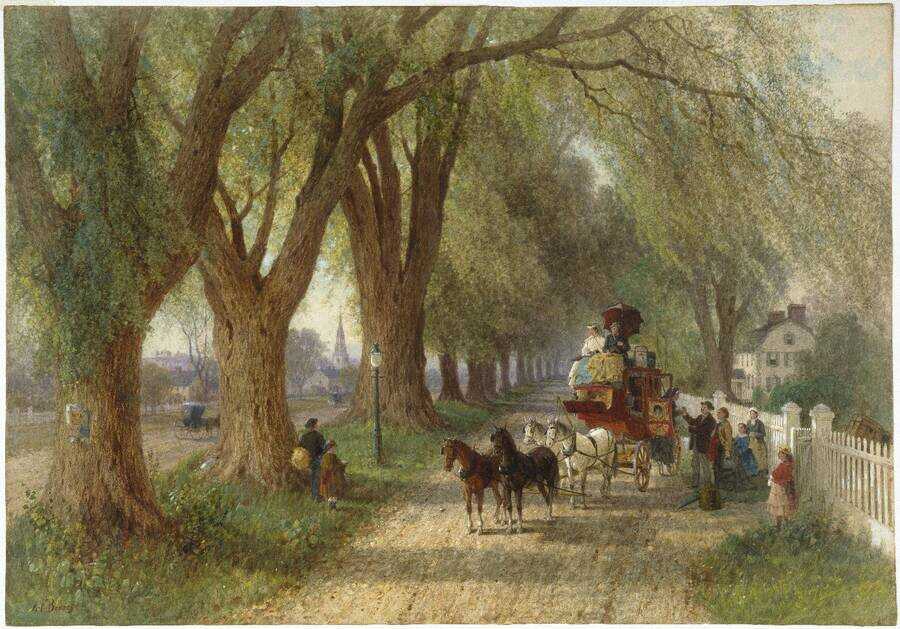- Prologue
-
Captain's Blog
Captain's Blog Menu
Akio Tsukino
-
Appendix
Appendix Menu
-
Bible Data
The Bible Menu
Science And The Bible
- Epilogue
Lyceums were the personal neutrionic hand held devices given to each passenger and crew member on the space station Laurasia. They were used as personal journals on their mission as well as to communicate directly with friends and family on the surface of planet earth. The following are random excerpts from the personal Lyceum of Chris Lehrer.
Museum
Selections of art taken from Chris Lehrer's Lyceum under the heading: Window to the Past.Coaching in New England, by Albert Fitch Bellows: 1876
Radio Laurasia
Listen to Soma FM streaming radio, a favorite of the space station Laurasia since the global revolution. You may or may not have to download the free Winamp or Real Audio audio player.
Video Playlist
After the global revolution and prior to the great destruction much of the internet was preserved by the Ministry of Science and Technology (MoST). Sounds and visions from planet Earth were cherished on long excursions aboard Laurasia. This - is Beck.
Green Bank, United States
Analects: Book 3
Book 3. Pa Yih 八佾第三: Eight Lines of Eight Dancers Apiece
[3:1] Confucius said of the head of the Chi family, who had eight rows of pantomimes in his area, "If he can bear to do this, what may he not bear to do?"
[3:2] The three families used the yung ode, while the vessels were being removed, at the conclusion of the sacrifice. The Master said, "'Assisting are the princes; the son of heaven looks profound and grave:' what application can these words have in the hall of the three families?"
[3:3] The Master said, "If a man be without the virtues proper to humanity, what has he to do with the rites of propriety? If a man be without the virtues proper to humanity, what has he to do with music?"
[3:4] Lin Fang asked what was the first thing to be attended to in ceremonies.
The Master said, "A great question indeed!
"In festive ceremonies, it is better to be sparing than extravagant.
In the ceremonies of mourning, it is better that there be deep sorrow than a minute attention to observances."
[3:5] The Master said, "The rude tribes of the east and north have their princes, and are not like the States of our great land which are without them."
[3:6] The chief of the Chi family was about to sacrifice to the T'ai mountain. The Master said to Zan Yu, "Can you not save him from this?" He answered, "I cannot." Confucius said, "Alas! will you say that the T'ai mountain is not so discerning as Lin Fang?"
[3:7] The Master said, "The student of virtue has no contentions. If it be said he cannot avoid them, shall this be in archery? But he bows complaisantly to his competitors; thus he ascends the hall, descends, and exacts the forfeit of drinking. In his contention, he is still the Chun-tsze."
[3:8] Tsze-hsia asked, saying, "What is the meaning of the passage: 'The pretty dimples of her artful smile! The well-defined black and white of her eye! The plain ground for the colors?'"
The Master said, "The business of laying on the colors follows (the preparation of) the plain ground."
"Ceremonies then are a subsequent thing?" The Master said, "It is Shang who can bring out my meaning. Now I can begin to talk about the odes with him."
[3:9] The Master said, "I could describe the ceremonies of the Hsia dynasty, but Chi cannot sufficiently attest my words. I could describe the ceremonies of the Yin dynasty, but Sung cannot sufficiently attest my words. (They cannot do so) because of the insufficiency of their records and wise men. If those were sufficient, I could adduce them in support of my words."
[3:10] The Master said, "At the great sacrifice, after the pouring out of the libation, I have no wish to look on."
[3:11] Someone asked the meaning of the great sacrifice. The Master said, "I do not know. He who knew its meaning would find it as easy to govern the kingdom as to look on this." - pointing to his palm.
[3:12] He sacrificed to the dead, as if they were present. He sacrificed to the spirits, as if the spirits were present.
The Master said, "I consider my not being present at the sacrifice, as if I did not sacrifice."
[3:13] Wang-sun Chia asked, saying, "What is the meaning of the saying, 'It is better to pay court to the furnace than to the south-west corner?'"
The Master said, "Not so. He who offends against Heaven has none to whom he can pray."
[3:14] The Master said, "Chau had the advantage of viewing the two past dynasties. How complete and elegant are its regulations! I follow Chau."
[3:15] The Master, when he entered the grand temple, asked about everything. Someone said, "Who will say that the son of the man of Tsau knows the rules of propriety! He has entered the grand temple and asks about everything." The Master heard the remark, and said, "This is a rule of propriety."
[3:16] The Master said, "In archery it is not going through the leather which is the principal thing; because people's strength is not equal. This was the old way."
[3:17] Tsze-kung wished to do away with the offering of a sheep connected with the inauguration of the first day of each month.
The Master said, "Ts'ze, you love the sheep; I love the ceremony."
[3:18] The Master said, "The full observance of the rules of propriety in serving one's prince is accounted by people to be flattery."
[3:19] The Duke Ting asked how a prince should employ his ministers, and how ministers should serve their prince. Confucius replied, "A prince should employ his minister according to the rules of propriety; ministers should serve their prince with faithfulness."
[3:20] The Master said, "The Kwan Tsu is expressive of enjoyment without being licentious, and of grief without being hurtfully excessive."
[3:21] The Duke Ai asked Tsai Wo about the altars of the spirits of the land. Tsai Wo replied, "The Hsia sovereign planted the pine tree about them; the men of the Yin planted the cypress; and the men of the Chau planted the chestnut tree, meaning thereby to cause the people to be in awe."
When the Master heard it, he said, "Things that are done, it is needless to speak about; things that have had their course, it is needless to remonstrate about; things that are past, it is needless to blame."
[3:22] The Master said, "Small indeed was the capacity of Kwan Chung!"
Someone said, "Was Kwan Chung parsimonious?" "Kwan," was the reply, "had the San Kwei, and his officers performed no double duties; how can he be considered parsimonious?"
"Then, did Kwan Chung know the rules of propriety?"
The Master said, "The princes of States have a screen intercepting the view at their gates. Kwan had likewise a screen at his gate. The princes of States on any friendly meeting between two of them, had a stand on which to place their inverted cups. Kwan had also such a stand. If Kwan knew the rules of propriety, who does not know them?"
[3:23] The Master instructing the grand music-master of Lu said, "How to play music may be known. At the commencement of the piece, all the parts should sound together. As it proceeds, they should be in harmony while severally distinct and flowing without break, and thus on to the conclusion."
[3:24] The border warden at Yi requested to be introduced to the Master, saying, "When men of superior virtue have come to this, I have never been denied the privilege of seeing them." The followers of the sage introduced him, and when he came out from the interview, he said, "My friends, why are you distressed by your master's loss of office? The kingdom has long been without the principles of truth and right; Heaven is going to use your master as a bell with its wooden tongue."
[3:25] The Master said of the Shao that it was perfectly beautiful and also perfectly good. He said of the Wu that it was perfectly beautiful but not perfectly good.
[3:26] The Master said, "High station filled without indulgent generosity; ceremonies performed without reverence; mourning conducted without sorrow; wherewith should I contemplate such ways?"
Book 3. Bā Yì 八佾: Eight Lines of Eight Dancers Apiece
[3:1] Confucius observed of the Ji family, They have eight rows of dancers in their courtyard. If this can be excused, what cannot be excused? [F1]
[3:2] The three Ji families used the Yong ode when the sacrifices were being carried away. [F2]
The Master said, Assisting are the great lords, the Son of Heaven in majesty, How can this be used in the halls of the three Ji families?
[3:3] The Master said, A human being who lacks humaneness — what is ritual to someone like that? A human being who lacks humaneness — what is music to someone like that?
[3:4] Lin Fang asked what is basic in ritual. The Master said, A big question indeed! In rites in general, rather than extravagance, better frugality. In funeral rites, rather than thoroughness, better real grief.
[3:5] The Master said, The Yi and Di tribes with their rulers cannot match the Xia people without a ruler. [F3]
[3:6] The head of the Ji family was planning to make a sacrifice to Mount Tai. [F4] The Master said to Ran You, Can’t you save him from this?
Ran You replied, No, I can’t.
The Master said, Are we to suppose that Mount Tai knows less about ritual than Lin Fang?
[3:7] The Master said, The gentleman never strives with others. To be sure, there are the archery matches. But even they have their bows and deferences as the contestants go up and come down, and the wine drinking at the end. Such is the “striving” of the gentleman.
[3:8] Zixia asked, saying, Her artful smile engaging, lovely eyes in clear outline, colors on a white ground, [F5] What do these lines mean?
The Master said, The painting comes after the white background.
Zixia said, So ritual comes afterward?
The Master said, Shang (Zixia) is the one who reads my meaning. At last I have someone to discuss the Odes with.
[3:9] The Master said, As for the Xia rites, I could describe them, but the state of Qi can’t provide the proofs I need. As for the Yin rites, I could describe them, but the state of Song can’t provide the proofs I need. [F6] This is due to the lack of records and persons of authority. If these were sufficient, I could prove my words.
[3:10] The Master said, As for all that comes after the libation to the spirits in the ancestral sacrifice — I have no wish to see it. [F7]
[3:11] Someone asked about the meaning of the ancestral sacrifice. The Master said, I don’t know. Someone who knew its meaning would understand all the affairs of the world as if they were displayed right here — and he pointed to his palm.
[3:12] Sacrifice as if they were present means to sacrifice as if the gods were present. But the Master said, If I can’t take part in the sacrifices, it’s as though I haven’t sacrificed at all.
[3:13] Wangsun Jia said, Better pay compliments to the kitchen stove than to the southwest corner. [F8] What does this mean?
The Master said, Not true! If you incur blame with Heaven, you have nowhere to turn for forgiveness! [F9]
[3:14] The Master said, Zhou surveyed the two dynasties that went before, its ways are refined and elegant. I follow Zhou.
[3:15] When the Master entered the Grand Temple, [F10] he asked questions about everything. Someone said, Who claims that this son of a man of Zou [F11] understands ritual? When he enters the Grand Temple he asks about everything!
When the Master heard this, he said, Asking is part of the ritual.
[3:16] The Master said, In archery hitting the target is not the point — people are not all of equal strength. That was the old-time way.
[3:17] Zigong wanted to do away with the sacrificial sheep at the first-of-the-month announcement to the ancestors. The Master said, Si (Zigong), you care about the sheep; I care about the ritual.
[3:18] The Master said, In serving the ruler, if you carry out all the acts prescribed by ritual, people think you are toadying.
[3:19] Duke Ding asked how the ruler should treat his ministers and how the ministers should serve the ruler.
Confucius replied, The ruler should treat his ministers in accordance with ritual. The ministers should serve the ruler with loyalty.
[3:20] The Master said, The Guanju ode [F12] — joy, but not excessive; sadness, but not to the point of injury.
[3:21] Duke Ai asked Zai Wo about the altar to the god of the soil. Zai Wo replied, The Xia rulers planted it with pines, the men of Yin planted it with cedars, and the men of Zhou plant it with chestnuts (li), in order, they say, to make the common people tremble (li). [F13]
When the Master heard of this, he said, Completed affairs one does not comment on; things done one does not carp over; what is past one does not criticize.
[3:22] The Master said, Guan Zhong was a man of small parts!
Someone objected, saying, Guan Zhong was noted for frugality, was he not?
The Master said, Guan Zhong had his Three Returnings mansion, [F14] and he did not require his staff to perform double duties — how can that be called frugal?
But, said the other person, Guan Zhong understood ritual, did he not?
The Master said, Rulers of states put up gate screens, and Mr. Guan put up a gate screen too. Rulers of states, when entertaining another ruler, have a stand for inverted wine cups, and Mr. Guan had a stand for inverted wine cups too. If Mr. Guan understood ritual, who doesn’t understand ritual?
[3:23] The Master, speaking with the Grand Music Master of Lu, said, Music can be understood in this way. The players first in unison, then freely harmonizing, playing separately or carrying on from one another, and thus the piece is completed.
[3:24] The border guard of Yi requested an interview with Confucius, saying, When gentlemen pass this way, I never fail to have an interview with them.
The Master’s followers arranged a meeting. When the border guard emerged from the interview, he said, You young men should not worry about your present bad luck. For a long time now the world has been without the Way. Heaven is going to use your Master as a wooden-clappered bell. [F15]
[3:25] Of the Shao music, the Master said, Perfect in beauty, perfect in goodness. Of the Wu music, he said, Perfect in beauty, but not perfect in goodness. [F16]
[3:26] The Master said, Standing above others but without tolerance, carrying out rites but without reverence, conducting funeral proceedings but without grief — how can I bear to view such as these?
Footnotes
[F1] According to Zhou ritual, only the Son of Heaven was privileged to have eight rows of dancers in the ceremonies in the courtyard before his ancestral temple. Persons of lower rank were expected to have a lesser number. The Ji families were ministers to a feudal lord and hence considerably lower in rank, yet they usurped the rites of the supreme ruler. Confucius sees this as an indication of social disharmony and moral decay.
[F2] Book of Odes, no. 282. As the lines quoted by Confucius indicate, it was intended for use in sacrifices at which the Son of Heaven and the great feudal lords were present.
[F3] The Yi and Di were non-Chinese peoples who lived to the east and northwest of the Chinese, the Xia people.
[F4] The sacrifice that the head of the Ji family proposes to perform is appropriate only to a feudal lord, not to one of his ministers.
[F5] Book of Odes, no. 57. Only the first two lines are found in the present text of the Odes.
[F6] The descendants of the Xia rulers were enfeoffed in the small state of Qi in order to carry on their ancestral sacrifices; those of the Yin rulers, in the state of Song.
[F7] The di sacrifice to the ancestral spirits was ordinarily performed by the Son of Heaven alone. But because of Lu’s close connections with the founders of the dynasty, the ruler of Lu had been given special permission to perform it. Evidently, Confucius disapproved of something about the way the ritual was performed.
[F8] The southwest corner of the house, where sacrifices to the ancestors were held.
[F9] A folk saying, meaning that it is better to make sure you have enough to eat rather than worrying about the ancestors. Confucius rejects this cynical view.
[F10] The ancestral temple of Lu, dedicated to the duke of Zhou, the founder of the state.
[F11] Birthplace of Confucius’s father.
[F12] Book of Odes, no. 1, which describes a young man pining for his love and the later happy union of the pair.
[F13] Confucius perhaps did not approve of this pun on li (chestnut/tremble) because of its linking of government with feelings of fear.
[F14] Various explanations of the name Three Returnings are given, one being that it housed Guan Zhong’s three wives. In any event, Confucius disapproved of the way Guan Zhong, an official of the state of Qi, imitated the ways of a ruler.
[F15] A bell with a wooden clapper, used to summon people for important announcements.
[F16] The Shao, or “Succession,” music was said to date from the time when Shun ascended the throne peacefully ceded to him by Yao. The Wu, or “Martial,” music was from the time when the Zhou dynasty forcefully overthrew the Yin. The music was probably accompanied by dance performances.
Book 3
[3:1] Of the Chi having eight rows of dancers [F23] in his courtyard, Confucius said, If this is to be borne, what is not to be borne?
[3:2] When the sacrifice was ended, the Three Clans had the Yung hymn sung.
The Master said,
Princes and dukes assist.
Solemn is the Son of heaven;
what meaning has this in the courtyard of the Three Clans?
[3:3] The Master said, A man without love, what is courtesy to him? A man without love, what is music to him?
[3:4] Lin Fang asked what good form is at root.
The Master said, A big question! At high-tides, thrift is better than waste; at burials, grief is worth more than nicety.
[3:5] The Master said, Every wild tribe has its lord, whereas the lands of Hsia [F24] have none!
[3:6] The Chi sacrificed to Mount T'ai. [F25]
The Master said to Jan Yu, [F26] Canst thou not stop this?
He answered, I cannot.
Alas! said the Master; dost thou think Mount T'ai less wise than Lin Fang?
[3:7] The Master said, A gentleman never strives with others. Or must he, perhaps, in shooting? But then, as he bows and makes way in going up or steps down to drink, [F27] his strife is that of a gentleman.
[3:8] Tzu-hsia asked, What is the meaning of:
Her cunning smiles,
Her dimples light,
Her lovely eyes,
So clear and bright,
All unadorned,
The background white.
Coloring, said the Master, is second to the plain ground.
Then good form is second, said Tzu-hsia.
Shang, [F28] said the Master, thou hast hit my meaning! Now I can talk of poetry to thee.
[3:9] The Master said, I can speak of the manners of Hsia; but as proof of them Chi [F29] is not enough. I can speak of the manners of Yin; but as proof of them Sung is not enough. This is due to their dearth of books and great men. If there were enough of these, I could use them as proofs.
[3:10] The Master said, After the drink offering at the Great Sacrifice, I have no wish to see more.
[3:11] One asked the meaning of the Great Sacrifice.
The Master said, I do not know. He that knew the meaning would overlook all below heaven as I do this — and he pointed to his palm.
[3:12] He worshipped as if those whom he worshipped were before him; he worshipped the spirits as if they were before him.
The Master said: For me, to take no part in the sacrifice is the same as not sacrificing.
[3:13] Wang-sun Chia [F30] said, What is the meaning of, It is better to court the hearth-god than the god of the home?
Not so, said the Master. A sin against Heaven leaves no room for prayer.
[3:14] The Master said, Chou [F31] looks back on two lines of kings. How rich, how rich it is in art! I follow Chou.
[3:15] On going into the Great Temple the Master asked about everything.
One said, Who says that the Tsou man's son knows the rites? On going into the Great Temple he asked about everything.
When he heard this, the Master said, Such is the rite.
[3:16] The Master said, In shooting, the arrow need not go right through the target, for men are not the same in strength. This was the old rule.
[3:17] Tzu-kung wished to do away with the sheep offering at the new moon.
The Master said, Thou lovest the sheep, Tz'u: I love the rite.
[3:18] The Master said: Serve the king with all courtesy, men call it fawning.
[3:19] Duke Ting asked how a lord should treat his lieges, and how lieges should serve their lord.
Confucius answered, The lord should treat his lieges with courtesy; lieges should serve their lord faithfully.
[3:20] The Master said, The poem The Osprey is glad, but not wanton; it is sad, but not morbid.
[3:21] Duke Ai asked Tsai Wo about the earth-altars.
Tsai Wo answered, The Emperors of the house of Hsia grew firs round them; the men of Yin grew cypress; the men of Chou grew chestnut, which was to say, Let the people tremble. [F32]
On hearing this, the Master said, I do not speak of what is ended, chide what is settled, or find fault with what is past. [F33]
[3:22] The Master said, How shallow was Kuan Chung!
But, said one, was not Kuan Chung thrifty?
The Kuan, said the Master, owned San Kuei, and no one of his household held two posts: was that thrift?
At least Kuan Chung knew good form.
The Master said, Kings screen their gates with trees; the Kuan, too, had trees to screen his gate. When two kings are carousing, they have a stand for the turned-down cups; the Kuan had a turned-down cup-stand, too! If the Kuan knew good form, who does not know good form? [F34]
[3:23] The Master said to the Great Master [F35] of Lu, We can learn how to play music; at first each part in unison; then a swell of harmony, each part distinct, rolling on to the finish.
[3:24] The warden of Yi asked to see Confucius, saying, No gentleman has ever come here whom I have failed to see.
The followers took him in.
On leaving he said, My two-three boys, why lament your fall? The Way has long been lost below heaven! Now Heaven shall make the Master into a warning bell.
[3:25] The Master said of the music of Shao, It is thoroughly beautiful, and thoroughly good, too. Of the music of Wu, he said, It is thoroughly beautiful, but not thoroughly good.
[3:26] The Master said, Rank without beauty; ceremony without reverence; mourning without grief, why should I cast them a glance?
Footnotes
[F23] An Imperial prerogative.
[F24] China.
[F25] A prerogative of the Duke of Lu.
[F26] A disciple in the service of the Chi.
[F27] The loser had to drink a cup of wine.
[F28] Tzu-hsia.
[F29] Chi was the homeland of the House of Hsia, Sung that of the House of Yin.
[F30] Wang-sun Chia was minister of Wei, and had more influence than his master. The hearth-god ranks below the god of the home (the Roman lares), but since he sees all that goes on in the house, and ascends to heaven at the end of the year to report what has happened, it is well to be on good terms with him.
[F31] The royal house of Chou, which was then ruling China.
[F32] Tremble and chestnut have the same sound in Chinese.
[F33] In old times men had been sacrificed at the earth-altars, and Tsai Wo's answer might seem to approve the practice.
[F34] Kuan Chung (+ 645 BCE), a famous man in his day, was chief minister to the Duke of Ch'i, whom he raised to such wealth and power that he became the leading prince of the empire. His chief merit lay in taming the barbarous frontier tribes. The rest of his work was built upon sand and died with him.
[F35] Of music.
Book 3. Ba Yi 八佾: Eight Lines of Eight Dancers Apiece
[3:1] Confucius, speaking about the head of the Qi family said, “He has eight rows of dancers in his court. If he does this, what will he not do?” [C1]
[3:2] The Three Families used the Yong Songs at the clearing of the sacrificial vessels. Confucius said,
Attended on by Lords and Princes:
How magnificent is the Son of Heaven!
How could these words be used in the halls of the Three Families?
[3:3] The Master said: “If a man has no ren what can his propriety be like? If a man has no ren what can his music be like?” [C3]
[3:4] Lin Fang asked about the fundamentals of ritual. Confucius said, “What an excellent question! In ritual, it is better to be frugal than extravagant; in funerals deep sorrow is better than ease.”
[3:5] The Master said: “The tribes of the East and North (Koreans and Mongolians), though having kings, are not equal to our people, even when lacking kings.” [C5]
[3:6] The Ji family went to make a sacrifice at Mount Tai. The master said to Ran You: “Can't you save them from this?” You responded: “I can't.” The master said: “Alas! Does this mean that Mount Tai is not the equal of Lin Fang?” [F4]
[3:7] The Master said: “The noble man has nothing to compete for. But if he must compete, he does it in an archery match, wherein he ascends to his position, bowing in deference. Descending, he drinks the ritual cup. This is the competition of the noble man.”
[3:8] Zi Xia quoted the following:
Her tactful smile charms;
Her eyes, fine and clear,
Beautiful without accessories.
And asked its meaning. Confucius said, “A painting is done on plain white paper.” Zi Xia said, “Then are rituals a secondary thing?” Confucius said, “Ah, Shang, you uplift me. Now we can really begin to discuss the Book of Odes.” [C8]
[3:9] The Master said: “At the Great Sacrifice, after the pouring of the libation, I have no further desire to watch.”
[3:10] Someone asked for an explanation of the Great Sacrifice. Confucius said, “I don't know. If there were someone who knew this, he could see the whole world as if it were this:” He pointed to the palm of his hand.
[3:11] “Sacrificing as if present” means sacrificing to the spirits as if they were present. Confucius said, “If I do not personally offer the sacrifice, it is the same as not having sacrificed at all.”
[3:12] Wang Sun Jia asked: “What do you think about the saying ‘It is better to sacrifice to the god of the stove than to the god of the family shrine?’” Confucius said, “Not so. If you offend Heaven, there is no one you can pray to.”
[3:13] The Master said: “The people of the Zhou were able to observe the prior two dynasties and thus their culture flourished. I now follow the Zhou.”
[3:14] When Confucius entered the Grand Temple, he asked about everything. Someone said, “Who said Confucius is a master of ritual? He enters the Grand Temple and asks about everything!”
Confucius, hearing this, said, “This is the ritual.”
[3:15] The Master said: “In archery it is not important to pierce through the leather covering of the target, since not all men have the same strength. This is the Way of the ancients.”
[3:16] Zi Gong wanted to do away with the sacrifice of the sheep on the first of the month. Confucius said, “Ci, you love the sheep; I love the ceremony.”
[3:17] The Master said: “If you use every single courtesy while serving your prince, the people will call you a sycophant.”
[3:18] Duke Ding asked how a ruler should employ his ministers and how a minister should serve his ruler. Confucius replied, saying: “The prince employs his ministers with propriety; the ministers serve their prince with good faith.”
[3:19] The Master said: “The Guanju [F5] allows for pleasure without being lewd and allows for grief without being too painful.”
[3:20] The Duke of Ai asked Zai Wo about sacred temple grounds. Zai Wo said, “The Xia emperor planted them with pines; the Xiang people planted them with cypress and the Zhou people planted them with chestnut, thinking to cause people to be in awe of these trees.”
Confucius, hearing this, said, “Don't bother explaining that which has already been done; don't bother criticizing that which is already gone; don't bother blaming that which is already past.”
[3:21] The Master said: “Guan Zhong [F6] was quite limited in capacity.”
Someone asked: “Wasn't Guan Zhong frugal?”
Confucius said, “Guan had three sets of wives and his officers never worked overtime. How can he be considered to have been frugal?”
“But then did Guan Zhong understand propriety?” Confucius said, “The princes of the states have a special ritual screen at their door, and so did Guan Zhong (even though he was not of the proper rank to do this). When the princes of state had a friendly meeting, they would ritually turn their cups over on the table. Guan also turned his cups over on the table. If Guan Zhong understood propriety, then who doesn't?”
[3:22] Confucius, when talking with the Grand Music Master of Lu, said, “In my understanding of music, the piece should begin in unison. Afterwards, if it is pure, clear and without break, it will be perfect.”
[3:23] The border guard at Yi requested an audience with the Master, saying: “Whenever a noble man comes here, I never miss the opportunity to see him.” The disciples sent him in. When he came out, he said, “Friends, don't have any doubts about your master failing. The world has certainly lacked the Way for a long time now, but Heaven will use your master to awaken everyone.”
[3:24] The Master said: “Men of high office who are narrow-minded; propriety without respect and funerals without grief: how can I bear to look at such things?!”
Footnotes
[F4] Legge's note to this passage says (with conversion to Pinyin): “The Tai mountain is the first of the ‘five mountains’ which are celebrated in Chinese literature, and have always received religious honors. It was in Lu, or rather on the borders between Lu and Ji, about two miles north of the present department city of Tai-an in Shandong. According to the ritual of China, sacrifice could only be offered to those mountains by the sovereign, and by the princes in whose States any of them happened to be. For the chief of the Ji family, therefore, to sacrifice to the Tai mountain was a great usurpation. Lin Pang, from which the reason of this reference to him may be understood. Ran You was one of the disciples of Confucius, and is now third, in the hall, on the west. He entered the service of the Ji family, and was a man of ability and resource.”
[F5] The Guanju (“The Cry of the Ospreys”) is the first poem in the Book of Odes. It begins by describing a lover's grief at being separated from his lady and ends by describing their joyful union. (Waley, 99)
[F6] 管仲: Guan Zhong. (? –645 BCE) Spring and Autumn period 春秋時代 statesman, originally from the area of Yingshui 潁水. Familiar name was Yi Wu 夷吾, styled Zhong 仲, also known as Jing 敬, thus also known as Guan Zingzhong 管敬仲 and Guanzi 管子. He the prime minister 宰相 who switched loyalties after the assassination of his original lord to serve Duke Huan 桓公 of Qi 齊. He is considered to be responsible for many of the duke's administrative achievements. It was based upon the recommendation of his friend Bao Shu 鮑叔 that Duke Huan took him into his service, and Huan would go on to become known as one of the Five Hegemons 五覇. He is reputed to be the author of the Guanzi 管子.
Commentary
[C1] In this passage and the following one, Confucius is complaining about a lower-level aristocrat using ceremonies that were officially prescribed for much higher-level nobility. “Eight rows of dancers,” was the amount allowable to only the most elite of the nobility. The head of the Qi family is often criticized in the Analects for similar improprieties.
[C3] Since ren is the essence of all positive human attributes, without it, how can they truly operate?
[C5] Either Confucius is an outright ethnic chauvinist, or he is pointing to a real difference in the relative level of cultural development at that time between the central Chinese kingdoms and the peoples of the outlying regions.
[C8] Among all the ancient classical works available to scholars of the time, Confucius seems to place special value on the Book of Odes, for its strength in moral teachings as well as the intellectual stimulation it provided.
八佾第三
【第一章】孔子謂季氏、八佾舞於庭、是可忍也、孰不可忍也。
【第二章】三家者、以雍徹。子曰、相維辟公、天子穆穆、奚取於三家之堂。
【第三章】子曰、人而不仁、如禮何、人而不仁、如樂何。
【第四章】【一節】林放問禮之本。【二節】子曰、大哉問。【三節】禮、與其奢也、寧儉、喪、與其易也、寧戚。
【第五章】子曰、夷狄之有君、不如諸夏之亡也。
【第六章】季氏旅於泰山。子謂冉有曰、女弗能救與。對曰、不能。子曰、嗚呼、曾謂泰山、不如林放乎。
【第七章】子曰、君子無所爭、必也射乎、揖讓而升、下而飮、其爭也君子。
【第八章】子夏問曰、巧笑倩兮、美目盼兮、素以爲絢兮。何謂也。【二節】子曰、繪事後素。【三節】曰、禮後乎。子曰、起予者商也、始可與言詩已矣。
【第九章】子曰、夏禮吾能言之、杞不足徵也、殷禮吾能言之、宋不足徵也、文獻不足故也、足、則吾能徵之矣。
【第十章】子曰、禘、自既灌而往者、吾不欲觀之矣。
【十一章】或問禘之說。子曰、不知也、知其說者、之於天下也、其如示諸斯乎。指其掌。
【十二章】【一節】祭如在、祭神如神在。【二節】子曰、吾不與祭、如不祭。
【十三章】【一節】王孫賈問曰、與其媚於奧、寧媚於竈、何謂也。【二節】子曰、不然、獲罪於天、無所禱也。
【十四章】子曰、周監於二代、郁郁乎文哉、吾從周。
【十五章】子入大廟、每事問。或曰、孰謂鄹人之子知禮乎、入大廟、每事問。子聞之曰、是禮也。
【十六章】子曰、射不主皮、爲力不同科、古之道也。
【十七章】【一節】子貢欲去吿朔之餼羊。【二節】子曰、賜也、爾愛其羊、我愛其禮。
【十八章】子曰、事君盡禮、人以爲諂也。
【十九章】【一節】定公問君使臣、臣事君、如之何。孔子對曰、君使臣以禮、臣事君以忠。
【二十章】子曰、關睢樂而不淫、哀而不傷。
【廿一章】【一節】哀公問社於宰我。宰我對曰、夏后氏以松、殷人以柏、周人以栗、曰、使民戰栗。【二節】子聞之曰、成事不說、遂事不諫、既往不咎。
【廿二章】【一節】子曰、管仲之器小哉。【二節】或曰、管仲儉乎。【三節】曰、管氏有三歸、官事不攝、焉得儉。【四節】然則管仲知禮乎。【五節】曰、邦君樹塞門、管氏亦樹塞門、邦君爲兩君之好、有反坫、管氏亦有反坫、管氏而知禮、孰不知禮。
【廿三章】子語魯大師樂曰、樂其可知也、始作、翕如也、從之、純如也、繳如也、繹如也、以成。
【廿四章】儀封人請見、曰、君子之至於斯也、吾未嘗不得見也。從者見之、出曰、二三子、何患於喪乎、天下之無道也久矣、天將以夫子爲木鐸。
【廿五章】子謂韶、盡美矣、又盡善也、謂武、盡美矣、未盡善也。
【廿六章】子曰、居上不寬、爲禮不敬、臨喪不哀、吾何以觀之哉。
Confucius (Kǒng Fūzǐ (孔夫子; Kong Qui) traveled the country in an ox cart observing and teaching his numerous disciples on the subjects of civics, ethics, literature, music and science. Of course, he claimed no divine inspiration and so naturally the writings attributed to him, recorded by his disciples, also make no such claim.
- Clear View, by Terry Redlin: 1985 (original uncropped image)
- Animations: Dragonset, Matters of Grave Concern, The Pillars of Barad-Dur, Heart of Stone, Golden Leaves, Gravity, and Dragons in Moonlight, by Steven David Bennett
References
- Analects (Lun Yü)
- Wei Zheng
- James Legge
- Burton Watson
- A. Charles Muller
- Confucius
- Man of Tsau (Shandong)
- Disciples of Confucius
- Pantomime
- Propriety (Etiquette)
- Learning
- Heaven (Tian)
- Barbarian
- Mount Tai
- Book of Poetry/Odes (Shijing)
- Shang Dynasty (Hsia)
- Yin (Yinxu)
- Zhou Dynasty (Chau)
- Qi (State)
- Song (State)
- Lu (State)
- Pine
- Cedar
- Chestnut
- Tao/Dao (The Way)
- Korea
- Mongolia
- Noble Man (Junzi)
- Ren
- Sycophancy
 |
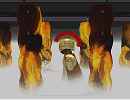 |
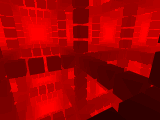 |
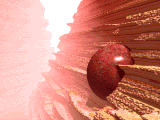 |
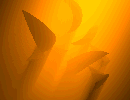 |
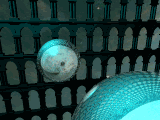 |
 |

